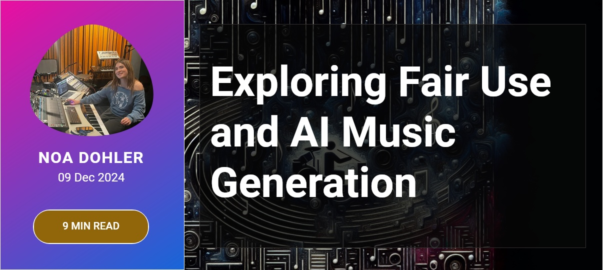AI Music Tech revolutionizes creativity, but legality remains unclear.
The intersection of artificial intelligence and music creation is triggering unprecedented legal debates. As questions of ownership rights in AI music become increasingly complex, understanding fair use has never been more crucial. The music industry stands at a crossroads where innovation meets tradition.
As a composer, I’ve witnessed firsthand the transformative power of AI in music creation. Last year, I experimented with an AI tool that analyzed my piano compositions and suggested harmonic variations – it was both thrilling and unsettling to hear my creative style being algorithmically dissected.
Understanding Fair Use in the Digital Age
The concept of fair use in music has evolved significantly with the advent of AI technology. According to recent developments, AI Music Tech companies are increasingly claiming fair use protection for their training methods. This foundational principle of copyright law permits limited use of copyrighted material without permission, provided it meets specific criteria. The legal framework evaluates factors including the purpose of use, nature of the copyrighted work, amount used, and potential market impact.
AI Music Generation and Legal Compliance
The integration of AI in music creation has sparked intense debate about compliance with existing copyright frameworks. As revealed in recent industry analyses, transformative use plays a crucial role in determining fair use applications. AI Music Tech platforms must navigate complex legal waters when processing copyrighted material for training purposes. Companies are developing sophisticated approaches to ensure their AI models respect intellectual property rights while pushing creative boundaries.
Balancing Innovation and Rights Protection
The challenge of harmonizing AI innovation with copyright protection has become increasingly complex. According to recent legal developments, courts are grappling with unprecedented questions about AI Music Tech and fair use. The music industry must find ways to protect creators’ rights while fostering technological advancement. This balance requires careful consideration of both artistic integrity and innovative potential.
Future-Proofing Fair Use Guidelines
As AI music generation capabilities expand, the need for updated fair use guidelines becomes critical. Research from leading policy experts suggests that traditional fair use doctrine requires significant adaptation for the AI era. The AI Music Tech landscape demands new frameworks that can accommodate both technological innovation and creator rights. Industry stakeholders are working to develop comprehensive guidelines that protect all parties involved.
Innovation Opportunities in AI Music Rights Management
Several promising business opportunities exist in the AI music rights management space. Companies could develop blockchain-based systems for tracking AI music usage and automating royalty payments. Smart contracts could enable real-time compensation for original artists whose works influence AI-generated content. Another potential innovation lies in creating AI-powered copyright detection tools that can identify potential infringement in real-time, helping both creators and platforms maintain compliance.
Shaping the Future of Music Creation
The convergence of AI and music creation presents unprecedented opportunities and challenges. As we navigate these uncharted waters, your voice matters in shaping the future of music creation. How do you envision fair use evolving in the age of AI? Share your thoughts and experiences with AI Music Tech – let’s contribute to this crucial conversation together.
Essential FAQ About AI Music and Fair Use
Q: What qualifies as fair use in AI music generation?
A: Fair use in AI music typically involves limited use of copyrighted material for transformation, research, or educational purposes, evaluated through four factors including purpose and market impact.
Q: Can AI-generated music be copyrighted?
A: Currently, AI-generated music’s copyright status is complex, as most jurisdictions require human creativity for copyright protection. Human involvement in the creative process may affect eligibility.
Q: How does fair use apply to training AI models?
A: Training AI models may qualify as fair use if it’s transformative and doesn’t substantially impact the market for original works, though this remains legally contested.
